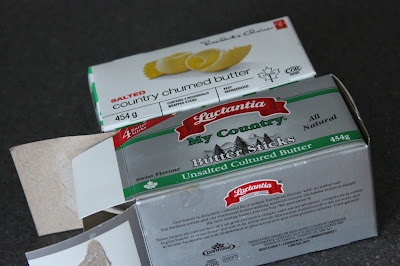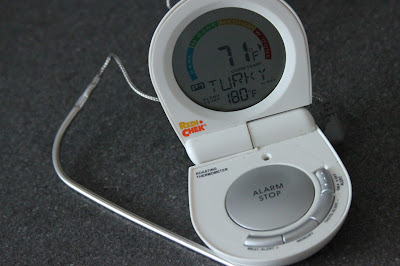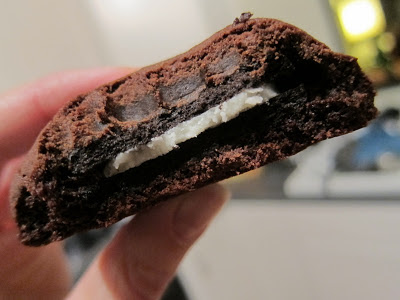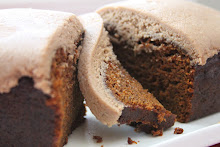For most average baking recipes, skill really isn't necessary (think cookies, cakes, pies), but you do need to follow the instructions exactly. If you're not an experienced baker, then you should not be experimenting, substituting any ingredients, or altering the original recipe in any way.
Tips to help you not suck at baking:
- Follow the recipe exactly. I cannot stress this enough. A lot of these tips will reiterate this point. Until you've really got the hang of a recipe, don't mess with it.
- If the recipe calls for unsalted butter, use unsalted butter. If the recipe just calls for "butter," use salted butter. It does make a difference. If you only have unsalted, use 1/4 tsp of salt per 1/2 cup of butter (1 stick). Also never cut or reduce the salt from a recipe. Or the sugar for that matter (unless it's icing, which often has way too much sugar).
- If the recipe calls for butter, use butter. Don't use margarine, or oil, or apple sauce, or any other weird thing you think is okay to substitute with. Substitutions aren't for people who "suck at baking". If it calls for margarine, use that. You get the idea.
- Buy sticks of butter, or use the lines on the package for accurate measurements.
- Don't estimate with ingredients. Use measuring spoons/ cups, and level them off with the flat side of a butter knife. Use liquid measuring cups for liquids (the glass ones are for liquids, and then you can look at the line and see if the liquid is in the right spot). Use dry measuring cups for dry ingredients (like the metal ones pictured). I have multiple sets of dry measuring cups and spoons, which makes baking easier and more pleasurable, as I don't have to constantly wash as I go. I have a variety of metal and plastic sets.
- If a recipe calls for salt, use table salt. If it calls for kosher salt, use that. Again, the exactness matters. Bulk Barn, or somewhere similar, is a great place to get little bits of things if you don't use them regularly.
- The pan you bake in matters. Recently my sister told me that she "sucks at baking" because her cakes always turn out dry. What she didn't realize, is that a glass 9x13 pan with rounded edges/sides is not good for baking cakes. You should be using a good metal pan, and the sides should be straight. Metal cookie sheets, 9x13 pans, square pans, and loaf pans are all baking necessities. I like to bake pie in a heavy, ceramic pie plate.
- If a recipe says don't over-mix, it's very important that you stir gently (with a wooden spoon or spatula) just until the ingredients are incorporated. Over-mixing results in tough baked goods.
- Lean towards under-baking everything. If a cookie recipe says to bake them for 8-10 minutes, I always, always take them out at 8 minutes. Even if they don't look completely done to you, they probably are, and will firm up once out at room temperature for a few minutes. If a cake recipe says, for example, to bake it for 35-40 minutes, I do the toothpick check at about 32 minutes. I don't want the toothpick to be completely clean, but rather have a crumb or two stick to it. This ensures you have a moist cake.
- Use room temperature ingredients, especially butter and margarine (for most things - but not for pies or anything requiring a flaky crust). Most recipes have you cream the butter or margarine with sugar to start, and you want the fat to be nice and soft for this so that it blends together easily. For pies, etc., you want very cold butter (the recipe should specify this).
- Unless the recipe specifically says which rack to bake on, use the rack in your oven that is second up from the bottom; I've found that this one works the best (I DON'T have a convection oven; I just have a regular oven).
- Don't open the oven while the food is baking, rather use the oven light to peek on it. Keeping an eye on your baking is a good thing, because you can pull it out when it's just barely done, which is when it's best.
- Folding ingredients in should be done with a spatula, and you don't want to stir, but rather fold the ingredients over each other (YouTube should have a video).
- Cutting in means to use a pastry blender (they're cheap - buy one) to cut the fat into little pieces inside the flour (YouTube should have a video).
- Take your time, and make sure you have all the ingredients before you start. It sounds obvious, but it's worth mentioning.
- All purpose flour is not the same as pastry flour, or self-rising, or whole wheat, etc. These are all different, and are not interchangeable. If a recipe simply says "flour", use all-purpose. Don't try to be all healthy, by substituting whole wheat flour for all-purpose, unless the recipe states that you can do so. It's baking - it's not supposed to be healthy, but it is supposed to taste good.
- Instead of spraying cookie sheets, I line them with parchment paper. I spray cake pans though (or butter them, depending what the recipe says). If I'm making squares that are firm, like puffed wheat or Nanimo bars, I'll press them into a parchment-lined pan, then just lift the parchment out later to cut them (once firmed up). I'll occasionally do this with loaves too.
- If using yeast, make sure you have the liquid you're dissolving it into at the right temperature. Your warm water/milk should be between 105-115 F. I use a digital meat thermometer. It doesn't matter which meat setting you have it on, just watch the temperature. Have your yeast (and sugar if the recipe calls for it) already measured out in a small dish. Run your tap water warm and hold the thermometer under it. Once it's around this temperature, measure out what you need and put it into a bowl. Check the temperature again, and if it's in the range, quickly add your yeast/sugar.
- Need a warm place for your dough to rise? Place it on the stove top (if the stove isn't on), and turn the light above your stove on. Or, if your oven isn't on, put it in the oven with the oven light on. Or just set it on the counter, and if your house isn't really cold, it will be fine. Speaking of house temperatures, they can affect baking, as can humidity. If you don't air condition when it's really hot out, or you keep your house really warm, it could affect your baking. You might want to chill your cookie dough if this is the case, and handle any dough as little as possible to prevent it from getting too warm/ soft.
- Lastly, have fun with it! If nothing you bake ever turns out for you, you probably don't enjoy baking. Take your time, be accurate, and keep an eye on what you're baking. Hopefully, after you have a bit of baking success, you'll start to enjoy it a bit more.
If you're an experienced baker, you'll know what you can get away with, and what you can't. I don't always use liquid measuring cups for liquids, etc., but I have done enough baking to know where it will matter and where it won't. I change recipes, and create my own, but I didn't always do this. It takes a lot of practice to figure out the science of it all, and to get comfortable experimenting. Baking is not like cooking; it's not as forgiving or as flexible.
Are you a good baker? Do you enjoy baking?








































2 comments:
This is a good list of tips! I did not know that metal cake pans work better than glass ones! I'll have to make sure we put metal cake pans on our registry!
Before I found out about my gluten intolerance, I would have said I was a better baker than cook because baking requires such precision and there are detailed instructions to follow, whereas cooking requires tasting and adjusting and recipes might say 'salt to taste'. I didn't trust myself enough to know how much salt to add to directions like that made me a little nervous! These days, though, I'm better at cooking than baking because GF baking is soooo hard. GF flours act so differently than wheat ones. There are great cookbooks available now, like America's Test Kitchen's cookbook, but sometimes things still don't turn out great.
Hello! I could have sworn I've visited your blog
before but after browsing through some of the posts
I realized it's new to me. Nonetheless, I'm definitely pleased I found it and I'll be book-marking it
and checking back often!
Post a Comment